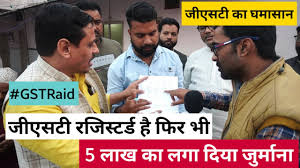भारत में वस्तु और सेवा कर (GST) के संदर्भ में, छापे या तलाशी निम्नलिखित सेक्शन के अंतर्गत की जाती है:
1. धारा 67 - निरीक्षण, तलाशी, और जब्ती की शक्ति:
- यह धारा अधिकारियों को कर चोरी के जोखिम पर वस्तुओं, दस्तावेजों, या किसी अन्य संबंधित आइटम का निरीक्षण, तलाशी और जब्ती करने की शक्ति देती है।
- यह अधिकृत अधिकारियों को करदाता व्यक्ति के किसी भी व्यवसाय स्थल का निरीक्षण करने की अनुमति देती है।
- यदि विश्वास हो कि कोई वस्तुएं जब्ती के लिए उत्तरदायी हैं या कोई दस्तावेज़ या पुस्तकें जो जांच के लिए आवश्यक हैं, किसी स्थान पर छुपाई गई हैं, तो अधिकारी उन स्थानों की तलाशी कर सकते हैं और वस्तुओं या दस्तावेजों को जब्त कर सकते हैं।
2. धारा 69 - गिरफ्तार करने की शक्ति:
- यह धारा आयुक्त को किसी व्यक्ति द्वारा धारा 132 के तहत वर्णित अपराध किए जाने के संदेह पर गिरफ्तारी की अनुमति देती है (जिसमें नकली चालान जारी करना, कर चोरी करना आदि गंभीर अपराध शामिल हैं)।
- कुछ मामलों में बिना वारंट के गिरफ्तारी की जा सकती है।
3. धारा 70 - साक्ष्य देने और दस्तावेज़ प्रस्तुत करने के लिए व्यक्तियों को समन करने की शक्ति:
- यह धारा अधिकारियों को जांच के हिस्से के रूप में व्यक्तियों को साक्ष्य देने या दस्तावेज़ प्रस्तुत करने के लिए समन करने की शक्ति देती है।
4. धारा 71 - व्यवसाय परिसर तक पहुँच:
- यह धारा अधिकारियों को ऑडिट, जाँच, या सत्यापन के लिए किसी भी व्यवसाय परिसर तक पहुँचने की शक्ति देती है।
5. धारा 132 - कुछ अपराधों के लिए सजा:
- यह धारा GST कानून के तहत दंडनीय अपराधों को सूचीबद्ध करती है, जिसमें कर चोरी, गलत चालान जारी करना, और संग्रहित कर को सरकार को नहीं देना शामिल है।
- यह विभिन्न अपराधों के लिए दंड और कारावास की अवधि को निर्दिष्ट करती है।
In the context of Goods and Services Tax (GST) in India,
raids or searches are typically conducted under the following sections of the
Central Goods and Services Tax (CGST) Act, 2017:
1. Section 67 - Power of Inspection, Search, and Seizure:
- This section
empowers officers to inspect, search, and seize goods, documents, or any other
relevant items if they believe there is a risk of tax evasion.
- It allows
authorized officers to inspect any place of business of the taxable person.
- If there is a
belief that any goods are liable to confiscation or any documents or books
which in any case are required for investigation are concealed in any place,
the officer can search such places and seize the goods or documents.
2. Section 69 - Power to Arrest:
- This section
allows the Commissioner to authorize an arrest if there is a reason to believe
that a person has committed an offense specified under Section 132 (which
includes severe offenses such as issuing fake invoices, evading tax, etc.).
- An arrest can be
made without a warrant in certain cases.
3. Section 70 - Power to Summon Persons to Give Evidence and
Produce Documents:
- This section
gives officers the power to summon individuals to appear before them to give
evidence or produce documents as part of the investigation.
4. Section 71 - Access to Business Premises:
- This section
gives officers access to any business premises for the purposes of carrying out
an audit, scrutiny, or verification.
5. Section 132 - Punishment for Certain Offenses:
- This section
lists offenses that are punishable under the GST law, including tax evasion,
issuing false invoices, and not paying collected tax to the government.
- It specifies the
penalties and terms of imprisonment for various offenses.
These sections collectively form the framework under which
GST raids and enforcement actions are conducted.








No comments:
Post a Comment
HAPPY TO HELP YOU ANY TIME ANYWHERE AND IF YOU WANT TO LEARN ANYTHING FROM US YOU CAN REACH US AT SONIKA987@GMAIL.COM